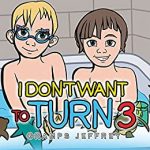Gramps Jeffrey Ponders Our Nation’s Opioid Overdose Epidemic and the Proliferation of Homeless Baby Boomers, Wonders Why We Can’t Do More
Guest post by Gramps Jeffrey, author of “I Don’t Want to Turn 3”

Gramps Jeffrey
For years, we Baby Boomers have viewed ourselves as the best generation our great country has ever seen. Prior to President Biden, who is a member of the Silent Generation (born 1925 to 1945), we Boomers (born 1946 to 1964) have actually run the country since the early 1990s: Bill Clinton from 1993 to 2001, George W. Bush from 2001 to 2009, Barack Obama from 2009 to 2017, and Donald Trump from 2017 to 2021.
But I’m asking you to look at the chaos we have created. Two issues stand out starkly for me: Our children are dying in record numbers from this opioid overdose epidemic and what have we done to fix this issue. And our fellow Baby Boomers are homeless in record numbers…
The 2020 Supplemental Poverty Measure (PLM) used by the Census Bureau put 12.8% of seniors 65+ below the poverty level. Considering that in 1966, seniors in poverty were at 28.5%, the Social Security Act, originally enacted by President Roosevelt in 1935, in has really worked to reduce the shame America had back then for our seniors. But looking at how this current 12.8% is put together – the poverty rate among Black seniors is 18%, among Hispanic seniors is 17.1% and among white seniors it is 6.8%.
According to the Los Angeles Continuum of Care (CoC), Life expectancy of people experiencing homelessness is 64 years old compared to 77 years old for the average person in the USA. 39% of older adults experiencing homelessness are Black/African American while 25% are Hispanic/Latinx and 30% are white. 80% are male and 20% are female.
The CoC says older adults fall into homelessness because:
- 1 in 10 have physical disabilities versus 2 in 10 of all persons experiencing homelessness.
- 7 in 10 have chronic illnesses versus 1.7 in 10 of all homeless.
- 1 in 2 homeless people cite economic hardship caused by eviction, foreclosure, and unemployment.
- 1 in 5 cite disabling health conditions such as physical illness, mental health issues and drug use.
- 3 in 10 cite weak social networks such as separations, conflicts with household members, and no friends or family available.
According to the Harvard Joint Center for Housing Studies, the number of people age 60 and over living in emergency shelters or transitional housing rose 69% over the last decade to 76,000 people. The incident of homelessness among older veterans has also risen to 19.2% of older veterans, up from 8.7% in 2009.
 With 73 million of us Boomers hanging around and another 10,000 joining us each day, how can we as a generation ease the pain for our fellow Baby Boomers who are suffering? Keeping in mind that American homelessness is not just a moral disgrace, but also an expensive one to fix; homelessness is basically a housing problem, and to get people into housing it takes big dollars.
With 73 million of us Boomers hanging around and another 10,000 joining us each day, how can we as a generation ease the pain for our fellow Baby Boomers who are suffering? Keeping in mind that American homelessness is not just a moral disgrace, but also an expensive one to fix; homelessness is basically a housing problem, and to get people into housing it takes big dollars.
The American Rescue Plan passed in March of this year, begins to solve our problem. In addition to $21.6B for low-income renters, it has $5B in HOME grants, which cities and counties can use to invest in permanent supportive housing to prevent homelessness. The entire annual outlay for federal Section 8 housing vouchers, as a comparison is $22B.
Knowing that if we funnel the right dollars into solving homelessness, having fewer people on the streets saves time and money in doctors and nurses providing health care, saves on policing and fire fighting expense and saves the time and expense of our entire criminal justice system.
Our government alone cannot solve this issue that should haunt all of us. It takes a web of city agencies, nonprofits, and religious institutions to concentrate on treating and helping the baby boomers who are in trouble.
 Now that many of us are retired or have more free time with no kids running around, we must be the volunteers who help the nonprofits and religious organizations implement the long-term solutions, so our children do not have to deal with this in the future. We all want to leave a baby boomer legacy that this society is better today because the Boomers got involved.
Now that many of us are retired or have more free time with no kids running around, we must be the volunteers who help the nonprofits and religious organizations implement the long-term solutions, so our children do not have to deal with this in the future. We all want to leave a baby boomer legacy that this society is better today because the Boomers got involved.
Thanks,
Gramps Jeffrey
 480-788-4786
480-788-4786


Leave a Reply
You must be logged in to post a comment.